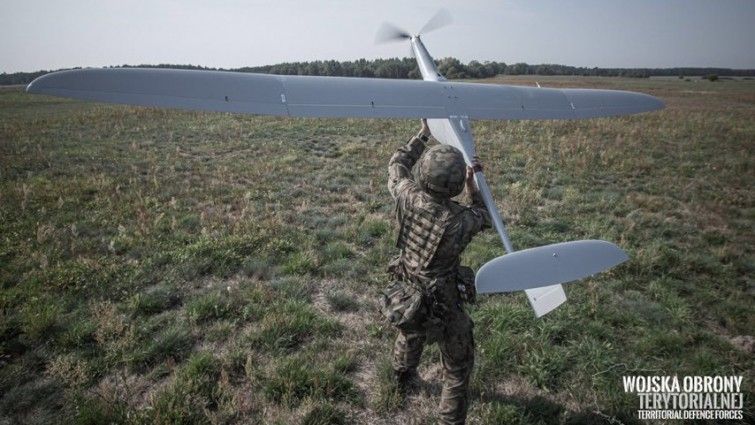Strona główna
Polish Territorial Defence Forces Receive Almost 50 FlyEye UAVs

Mariusz Błaszczak, head of the Polish MoD, announced that delivery of 12 sets of FlyEye UAV for the Territorial Defence Forces has been completed, in line with the relevant agreement signed by and between the MoD and the WB Electronics company. As of 2020 the systems in question will remain in the inventory of the Territorial Defence Forces. FlyEye UAV may be used for surveillance and reconnaissance activities.
The agreement signed by and between the Armament Inspectorate of the Polish MoD and the WB Electronics company concerned 3 modernized FlyEye packages with a pricetag of PLN 10.3 million. The contract was concluded on 3rd December 2018. The provisions of the agreement also envisaged optional acquisition of another 9 new generation FlyEye systems. Each and every set comprises of 4 UAVs. This means that 12 examples of the FlyEye UAV were procured within the basic portion of the agreement.
See also: New Generation of FlyEye Systems for the Polish Territorial Defence Component: Agreement Signed
The right of option concerning more of those systems has been exercised by the MoD on 18th July this year. Within the framework of additional Annex to the preceding agreement the MoD decided to acquire another 9 sets of FlyEye UAVs - 36 airframes in total, with a pricetag of 30 million zlotys. Total quantity of systems acquired within the framework of the aforesaid contract is defined as 12 sets comprising of 48 FlyEye systems.
The first training courses for the WOT FlyEye operators came to an end in early November this year. This means that, starting from January 2020, the Territorial Defence units will be ablle to carry out tactical reconnaissance autonomously. The UAV themselves would become a part of the local crisis management systems acting as an asset for the local communities in crisis or search and rescue scenarios.
Involvement of the Territorial Defence Forces in crisis response scenarios in May and June this year as well as SAR operations both constitute a factor that confirms and justifies rapid procurement of FlyEye systems and further purchases. UAVs provided by other branches of the military were used during the aforesaid operations. Nonetheless, over the course of those scenarios it has been proven that the Territorial Defence component should also operate the UAVs. In case of combat operations in crisis response or wartime, UAVs as such are to be used for the purpose of tactical reconnaissance for the individual units of the component and other elements cooperating with them.
Having 12 FlyEye sets placed in their inventory, the Territorial Defence Forces are the second largest user of drones as such in the Polish military. Land Forces (including the artillery units) and special operations component also operate the aforesaid system. The existing FlyEye UAVs also undergo relevant modifications. However, further deliveries are still a debatable subject. Especially, as the experience has shown, the systems may be handed off to the military quite quickly. We also know that saturation of the Army units with the FlyEye UAV (especially in the artillery component that uses the ZZKO Topaz fire control system coupled with FlyEye) is too low.
Mateusz Zielonka
